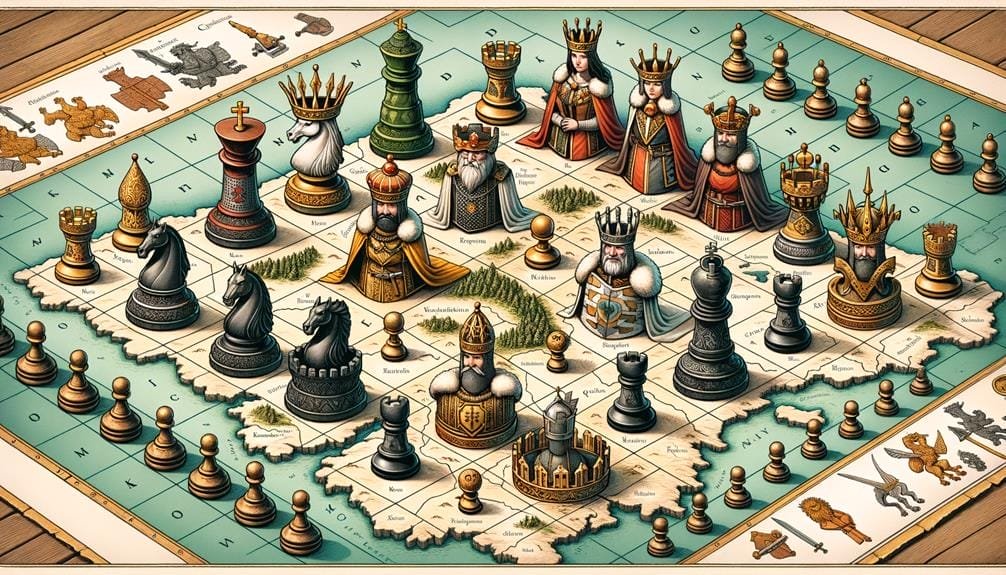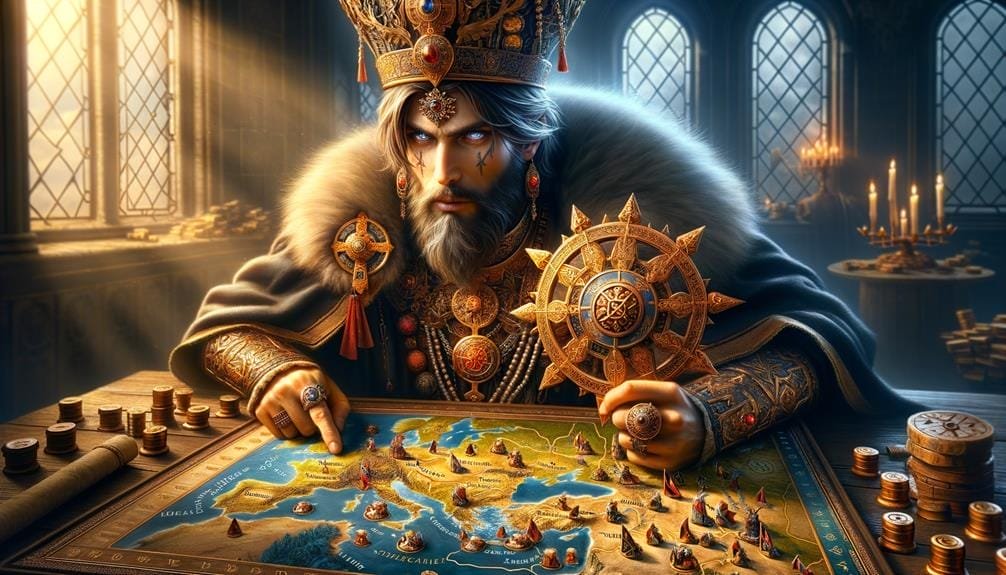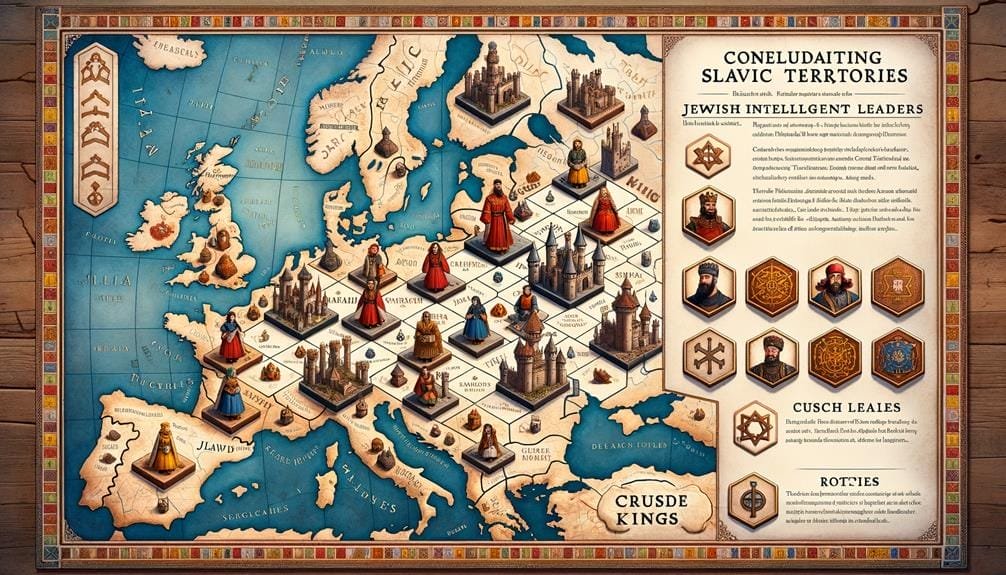Our Newsletter
Sign up for our e-mail newsletter and stay informed for what’s next on the horizon.
A recent survey revealed a compelling 75% of Crusader Kings 3 participants find the idea of consolidating the Slavic regions intriguing.
We’re here to delve into the potential and intricacies of this undertaking, particularly with the introduction of the Genius Rulers in the game.
From the complexities of medieval political maneuvers to the sway of Eastern spiritual beliefs, there’s much to unearth.
So, why not accompany us as we illuminate these absorbing aspects and ponder, who were these Genius Rulers, and how does their existence affect the gaming experience?
So, we introduce to you – the wild, meandering domain of Crusader Kings 3’s Slavic leaders. It’s a tempestuous dance of diplomacy and deceit, a game of strategy where kings and queens alternate with pagans and prophets.
Piloting through this labyrinth is far from being a simple mission, and uniting the Slavs seems like piecing together a thousand-piece puzzle of medieval political complexities.
But then again, isn’t this the allure of this game? It’s a lively, fluid collection of complex historical narratives.
Venturing into Crusader Kings 3, we become deeply involved in the potent and tactical universe of Slavic rulers, who play a crucial role in the establishment of the Empire of Slavia, a dominant power in Eastern Europe. This audacious project demands astute commanders to shape the Empire through strategic victories, merging the diverse mix of Slavic territories under a single sovereignty.
Nonetheless, we identify some inconsistencies in the game in terms of the boundaries and incorporation of certain regions and cultures within the Empire. These inconsistencies, though vexing, provide a peek into the intricate historical and cultural factors that influence the portrayal of Slavic rulers and territories in the game.
The allure of Crusader Kings 3 resides in the hurdles and complexities it introduces. As we participate, we undergo the complex choices that Slavic rulers are obliged to make. We’re the Ancient Deities, steering our people towards cohesion and abundance. Bringing together the Slavic lands is a formidable task, yet it’s a voyage that presents a compelling mix of strategy, history, and heritage.
It’s more than just a game; it’s a chronicle of power, aspiration, and the resilient spirit of the Slavic people.
In the multi-layered universe of Crusader Kings 3, we’re assigned the duty of not only unifying Slavic regions but also entwining ourselves in the complex network of medieval politics. It’s a careful balancing act, a game of chess where Europe serves as the board, and empires act as the players.
To keep our position in this world, we’re met with three primary obstacles:
Decoding these complexities is a daunting task, but it’s a hurdle we must overcome for our liberty. It’s a game of strategy, testing our skill to steer through this tangled political terrain.

Focusing now on the improvements in strategy and gameplay found in Crusader Kings 3, we’ll examine the advancements in character growth, upgraded diplomacy mechanisms, and superior tactical choices that can affect the outcome of uniting the Slavs.
This analysis will highlight how these components contribute to a deeply engaging and difficult gaming experience.
In Crusader Kings 3, the battlefield transforms into a decision-laden grid, with augmented tactical opportunities offering gamers an unprecedented level of command over their military confrontations. These refinements make for a more vibrant and interactive game experience, where each choice can shift the power dynamics.
These refinements provide a gratifying degree of autonomy, appealing to those craving for strategic depth and control.
While the updated combat dynamics add an exciting thrill to warfare, Crusader Kings 3 takes it a step further with its advanced diplomacy mechanics, introducing an entirely new dimension of strategic options in alliances, marriages, and vassal management.
We’re now able to negotiate non-aggression pacts, form protective alliances, and arrange betrothals with a greater depth of strategy than ever before. Diplomatic reach and sentiment modifiers hold a crucial role in building alliances and sustaining relationships, expanding our interaction choices and streamlining our diplomatic gameplay.
Skillful application of these diplomacy mechanics can result in more robust alliances, increased backing, and smoother territorial growth within the Empire of Slavia, making our mission to unify the Slavic territories an exhilarating and captivating journey.
Why not investigate the elaborate character development and its contribution to strategy and gameplay improvements in Crusader Kings 3’s Unite Slavs scenario? This game’s detailed character development now introduces new traits, capabilities, and events that genuinely augment your gameplay experience.
Here are three crucial improvements we’ve observed:
We’re confident, these refinements will make your gaming experience more enveloping and pleasurable.

As we focus on ‘Notable Slavic Leaders: An Overview’, we’ll highlight the powerful terms of notable Slavic rulers featured in Crusader Kings 3.
We’ll examine their distinct leadership tactics, acknowledging their military power, strategic partnerships, and territorial victories.
It’s captivating to observe how these brilliant leaders met the tasks of consolidating diverse Slavic tribes, forming the vibrant history and intricate politics of medieval Slavic societies.
Let’s dive into the captivating lives of some influential Slavic rulers, leaders who left lasting imprints on the historical and political maps of their respective territories. Our journey begins with:
These rulers not only molded their kingdoms but the Slavic identity itself, personifying the spirit of freedom and resilience that continues to inspire today.
Examining the strategies of significant Slavic leaders such as Mieszko I of Poland and Svatopluk I of Great Moravia, we reveal a combination of diplomacy, military expertise, and cultural sponsorship that not only unified diverse Slavic tribes, but also founded and enlarged their territories.
These brilliant rulers utilized diplomatic marriages, military victories, and alliances to fortify their power. Our leaders advocated for Slavic culture, language and traditions, encouraging unity among diverse tribes.
Figures like Boris I of Bulgaria and Vladimir the Great of Kievan Rus took it a step beyond, validating their authority through religious reforms and sponsorship of the Orthodox Church. This unique fusion of leadership strategies has left a lasting legacy, impacting Slavic history and the evolution of medieval Slavic nations.
Building on the innovative tactics of these visionaries, we now shift our attention to the periods of rule of some of the most distinguished Slavic leaders who made lasting contributions to history.
Each period of rule guided the course of Slavic history, their impact clearly seen in the liberty and self-rule enjoyed by their successors today.

Emphasizing the consolidation of Slavic territories into a single entity, the new add-on ‘Unite Slavs’ in Crusader Kings 3 provides players the opportunity to establish the Empire of Slavia, maneuvering through a labyrinth of cultural and political intricacies. This isn’t a simple land acquisition; players must meet particular criteria, mirroring the intricate fabric of Slavic history and politics.
The game masterfully intertwines cultural and historical aspects into determining which territories belong to the Empire. It’s not just about geographical positioning, but the mutual heritage, principles, and disputes that connect and separate these regions.
Partnerships and rivalries, both fresh and aged, are essential components to keep in mind as players strive for unity. It’s a fine balance of diplomacy and warfare, compelling players to consider the advantages of collaboration against the enticing appeal of domination.
The ‘Unite Slavs’ add-on isn’t just about enlarging your territory, it’s about comprehending the essence of Slavia. It offers a journey into the core of a diverse, lively culture, challenging players to unify not just territories, but communities, under one flag. This is the liberty that the add-on offers – to mold history, your way.
In the arduous journey to unify Slavic territories, perfecting certain pivotal skills can determine your triumph or downfall as a ruler. As we delve into the nuances of leadership, let’s underscore three significant areas where skill proficiency offers an advantage.
Intrigue abilities and learning attributes also have a part, steering through political intricacies and handling cultural dynamics. Nevertheless, these three skills lay the foundation of a successful rule.

A frequently undervalued element of governance in Crusader Kings 3 is the crucial function that religion serves, affecting everything from connections with vassals and adjacent rulers to dealings with the Pope. Distinct faiths offer exclusive advantages and difficulties, influencing our choices on regulations, alliances, and the methods we use to interact with religious heads.
As leaders, it’s our duty to skillfully handle religious variety within our territories. Our approach to religious strains can dictate if we’ve a stable rule or face constant disturbances. The consequences of religious choices are visible throughout our rule. Transforming provinces, backing religious authorities, or choosing to initiate holy wars can significantly alter our political terrain and the standing of our leader.
We mustn’t disregard that the religious makeup of our territories has a deep effect on diplomacy, succession regulations, and overall steadiness. We mustn’t belittle the strength of belief in Crusader Kings 3. It’s not solely about the blade and the throne; it’s also about the sanctuary. Religion, when utilized wisely, can be a potent instrument in our pursuit for unity and dominance.
Exploring the world of unlanded characters, it becomes clear that they’re not just mere observers in Crusader Kings 3. These impactful figures may not possess territories, but they can mold the political environment in different ways.
Primarily, these characters can be found in areas such as León, Druze, Egypt, Kabulistan, and Andalusia. Their faiths and cultures are as diverse as the roles they embody within the intricate political system.
Here’s a brief overview of the roles they can adopt:
Grasping these dynamics enhances our gameplay and strategic decisions. Their lack of land doesn’t equate to powerlessness. In Crusader Kings 3, every character holds a role, and liberty is a mindset, not only a territorial claim.

While characters without territories significantly mold the game’s political environment, pagan characters also command unique authority in Crusader Kings 3, providing a strikingly different gaming experience. These characters have access to special game mechanics and choices based on their faith, like raiding and holding Great Blots. Their ability to reform their faith and establish a more structured religion with specific doctrines and tenets is a major advantage, giving benefits and influencing gameplay in unique ways.
Pagan characters engage with the game world distinctly, interacting with religious leaders and sacred sites in a way particular to their faith. This variety can induce challenges from adjacent territories and faiths, leading to potential clashes and alliances based on faith. Remarkably, the pagan faiths in Crusader Kings 3 provide a unique experience of leadership. They highlight traditions, rituals, and ties to nature and ancestry, offering a gaming experience that’s refreshingly different and captivating.
In the grand strategy of Crusader Kings 3, pagan characters aren’t merely pawns. They’re influential participants, molding the game with their unique skills and traditions. The power they hold isn’t just military; it’s cultural, religious, and profoundly personal.
In Crusader Kings 3, the sway of Eastern religions is both deep and transformative. We’ll examine their effect, the intriguing transformation of Slavic leaders, and the distinctive religious strategies that come into play.
Let’s reveal how these spiritual components not only enrich the game experience but also introduce strategic depth and complexity.
Eastern religions’ hold on Crusader Kings 3 is profound, molding the convictions and rituals of characters from diverse regions such as Khorasan, Kabulistan, and Maharashtra. This sway is noticeable in gameplay elements and diplomatic strategies, infusing depth into the medieval world depicted in the game.
In essence, Eastern religions aren’t merely a background; they’re central to the game’s authenticity and intricacy.
Upon examining the intriguing universe of Slavic rulers in Crusader Kings 3, it becomes apparent that they’ve the option to adopt Eastern religions such as Buddhism, Jainism, Hinduism, and Taoism, introducing unique gameplay elements. These religious shifts are more than just cosmetic; they introduce new game mechanics, challenges, and immersive role-playing scenarios.
These changes can happen through various events, decisions, or interactions with characters of these faiths, adding a variable and unpredictable element to the game. The impact of Eastern religions can provide a strategic edge, offering unforeseen benefits and advantages to the Slavic rulers. This adoption of eastern philosophies allows players a degree of liberty, guiding their territories in unexpected trajectories.
It’s an intriguing turn of events, ensuring each game session is a unique journey.
Expanding on the spiritual transformations that Slavic leaders can experience, let’s analyze how embracing Buddhism, Hinduism, Jainism, or Taoism can mold gameplay strategies and outcomes.
Choosing Eastern religions, therefore, adds a new, intriguing layer to gameplay. It’s all about making decisions that mirror your preferred rule and liberty. Choose wisely, rulers!
In the engaging universe of Crusader Kings 3, it’s observed that Muslim characters contend with a distinctive array of difficulties, dealing with religious discord, internal disputes, and external dangers, all while aligning religious responsibilities with political goals. Muslim leaders must tactfully manage a complex network of alliances and rivalries to hold on to power and broaden their territories. This delicate act of statesmanship is further complicated by the exclusive mechanics that Muslim characters can utilize, like the Hajj pilgrimage and the capability to declare Jihads for holy battles.
Resistance can emerge from all directions for Muslim leaders. Other Muslims can dispute their authority, and adjacent Christian territories can present external dangers. It’s a dynamic, diverse game universe where every choice can have extensive implications.
To provide you a more precise understanding, here’s a table outlining the distinctive challenges confronted by Muslim characters:
| Challenges | Implications | Game Mechanics |
|---|---|---|
| Religious discord | Trouble in preserving unity | Hajj pilgrimage |
| Internal disputes | Power conflicts within territory | Capability to declare Jihads |
| External dangers | Dangers from neighboring territories | Aligning religious responsibilities with political goals |
The liberty to manage these difficulties makes Crusader Kings 3 a genuinely engaging experience.

Just as Muslim characters deal with unique challenges in Crusader Kings 3, Jewish characters also manage their own set of obstacles and advantages, influenced by their minority status and distinct religious traits. The strength of Jewish characters is found in the unique opportunities that their religion offers them, despite the potential hostility they may encounter from rulers of other faiths.
While these benefits offer a unique gameplay, they’re also counteracted by difficulties, including limited options for marriage alliances. This balance between strengths and challenges makes playing as a Jewish character an engaging and nuanced experience. As we traverse this complex landscape, we appreciate the freedom to choose and the diversity that Crusader Kings 3 presents, enabling us to investigate the strengths and challenges of various cultures.
Thus, we present to you – the untamed, twisting realm of Crusader Kings 3’s Slavic leaders. It’s a whirlwind waltz of diplomacy and trickery, a chess-like contest where kings and queens are interchanged with pagans and prophets.
Steering through this maze is no straightforward task, and bringing together the Slavs feels akin to assembling a thousand-piece puzzle of medieval political intrigues.
But then again, isn’t that the charm of this game? It’s a vibrant, dynamic compendium of intricate historical narratives.
For those new to CK3, we suggest starting with the Kingdom of Poland. Its central position, balanced strength, and historical richness make it a great choice. Additionally, it provides varied gameplay options with both Catholic and pagan neighbors.
‘Choosing a count in CK3 is straightforward, isn’t it? Simply start a new game and pick a character with a count title. Be aware, the path from count to emperor is a demanding one, but well worth the effort.’
Sign up for our e-mail newsletter and stay informed for what’s next on the horizon.